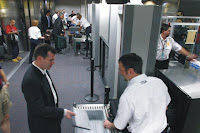The Global Security Challenge (GSC), providers of the leading international competition for security innovators, today announced the launch of the Most Promising Security Idea award. The award includes a $10,000 cash grant, sponsored by Accenture, as well as mentorship from the Civitas Group.
The award aims to identify, explore and reward innovation in the field of homeland security
technology. Its goal is to support and promote researchers, infant companies and other
inventors, and ensure valuable new technologies can develop and prosper.
- Applicants can enter online using on the Security Competition's webpage.
- Entry is free and all entrants will gain feedback on their submissions.
- The deadline for submissions is 1 September 2009.
- The awarding ceremony for the Most Promising Security Idea will take place during the GSC Security Summit held at London Business School on 13 November 2009.
initial product launch has certainly accelerated as a result of our participation, and we
greatly appreciate Accenture for making this GSC award possible.”
Dr. Alastair MacWillson, managing director of Accenture’s Global Security business, stated:
“Accenture is pleased to sponsor the Global Security Challenge for the fourth year. By
encouraging inventors and researchers to pursue their ideas, the GSC helps nurture cutting
edge security technologies, which can ultimately help build more sustainable and secure
organizations.”
The founders of the GSC, Simon Schneider and Janeen Chupa, commented in a joint
statement: “The Global Security Challenge is the launching pad for early-stage security
technologies. We are proud that our top contenders from previous competitions have
subsequently raised over $52 million in fresh capital.”







 And TSWG's requirements for explosives carried on someone’s person:
And TSWG's requirements for explosives carried on someone’s person: If your technology meets or exceeds these requirements you should enter the Global Security Challenge 2008.
If your technology meets or exceeds these requirements you should enter the Global Security Challenge 2008.